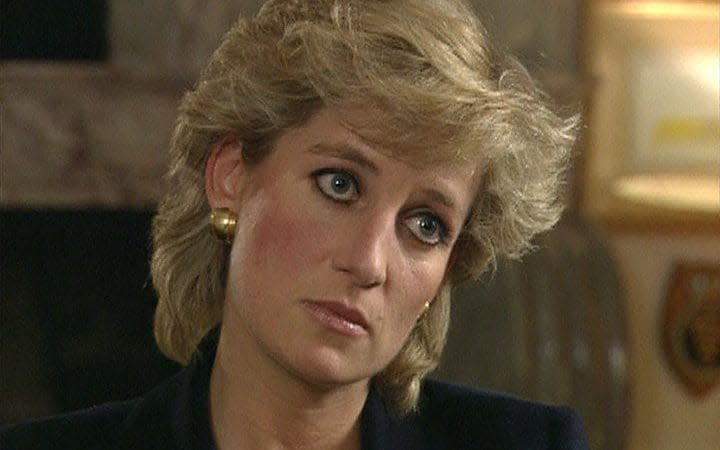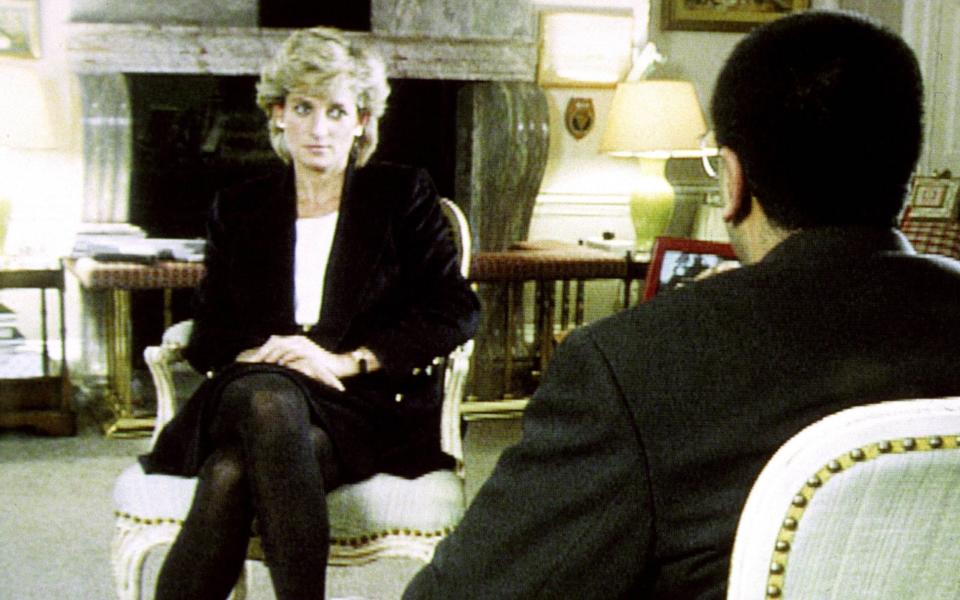Princess Diana insisted she was not coerced into bombshell Panorama interview, BBC claims

A handwritten note by Diana, Princess of Wales, exonerating the BBC over murky claims surrounding forged documents and exploitation might be expected to be kept tightly under lock and key.
But as new allegations emerge about exactly how Martin Bashir managed to secure that bombshell Panorama interview 25 years ago, mystery surrounds one piece of evidence that should alleviate both the presenter and the corporation of anything untoward.
Mr Bashir has been accused of using forged bank statements to coerce the Princess into baring her soul for the programme that would change the course of royal history, sending shockwaves reverberating through both the monarchy and the nation as a whole.
Almost 23 million viewers watched as she told him: "There were three of us in this marriage.”
The interview remains one of the most momentous events in television history.
Yet a new Channel 4 documentary, Diana: The Truth Behind the Interview, suggests that the corporation exploited the “unbalanced” and vulnerable princess, using the fake documents to prey on her insecurities and even suggesting that criminality could be at play.
At the time, the world’s most high profile journalists and television anchors were jostling to persuade the Princess to bare all.
So there was some surprise when eventually, she chose to sit down and reveal the excoriating detail of her crumbling marriage to Mr Bashir, a relatively unknown BBC reporter and a “100 to one outsider”.

“In relation to the pool of personalities trying to get an interview with Diana, he was a non-starter,” Andrew Morton, the Princess’s biographer, said.
The documentary claims that as Mr Bashir attempted to win the trust of the Princess, he commissioned two forged bank statements from a BBC graphic artist, which he showed to her brother, Earl Spencer.
The statements suggested that a former member of staff had betrayed him and was acting as a paid informant. One appeared to show that he had been paid £4,000 by News International and the other, that he had pocketed £6,500 from a mysterious Jersey-based outfit called Penfolds Consultants.
Mr Bashir is also said to have claimed he had information from a member of the intelligence service that Diana’s private apartments at Kensington Palace were being bugged.
The information so impressed Earl Spencer that he orchestrated a meeting between the reporter and his sister, the documentary claims.
The BBC insists that Princess Diana never saw the forged statements and that they were not used in any way that had a bearing on the interview.
But Mr Morton suggests otherwise.

“I spoke to people who were very very close to the Princess of Wales who said they had discussed these bank statements in October 1995 and they discussed with Diana the importance of these documents and they discussed with Diana whether or not she should give an interview,” he said.
“It all makes sense when you realise that she lived in a world of anxiety and possible surveillance and that Martin Bashir very cleverly, in a very sophisticated way, played on that.
“Speaking to those in Diana’s circle at that time you can get a sense of why those bank statements were a tipping point that made her mind up to sit down at Kensington Palace and speak about her life to Martin Bashir.”
Patrick Jephson, the Princess’s private secretary, accused the BBC of “seduction and betrayal.”
Yet a critical note said to have been written by Princess Diana insisting that she was not misled and that the documents played no part in her decision to give the interview, has disappeared.
In a statement, the BBC said: “The BBC's internal records from the time indicate that Martin had met the Princess of Wales before the mocked-up documentation existed. These accounts also say that the Princess of Wales confirmed in writing that these documents played no part in her decision to give the interview.”
A spokeswoman added: “The BBC itself no longer possesses a physical copy of this note. But its existence is documented in the BBC’s records, and it was seen, at the time, by BBC management.”
Mr Morton described such a turn of events as “astonishing.”
He said: “If they received a letter saying the Princess of Wales herself was very happy about the way that the programme was made, that would bombproof them against any future concerns.”
The documentary reveals that another catalyst for the interview, Prince Charles’s revelation to Jonathan Dimbleby the previous year that he had committed adultery, had almost never been made.
The first version of that interview, which was never broadcast, did not reference his infidelity but he was persuaded to do a second take, it is claimed.
Three months before recording the Panorama interview, the Princess had met Sir Max Hastings, then editor of the Daily Telegraph, telling him that her marriage was “hell from day one.”
But he said: “I felt that my job was to try and help them keep the lid on the worst of this, rather than to lift it off.”
Diana: The Truth Behind The Interview will be broadcast on Channel 4 on October 21 at 9pm


